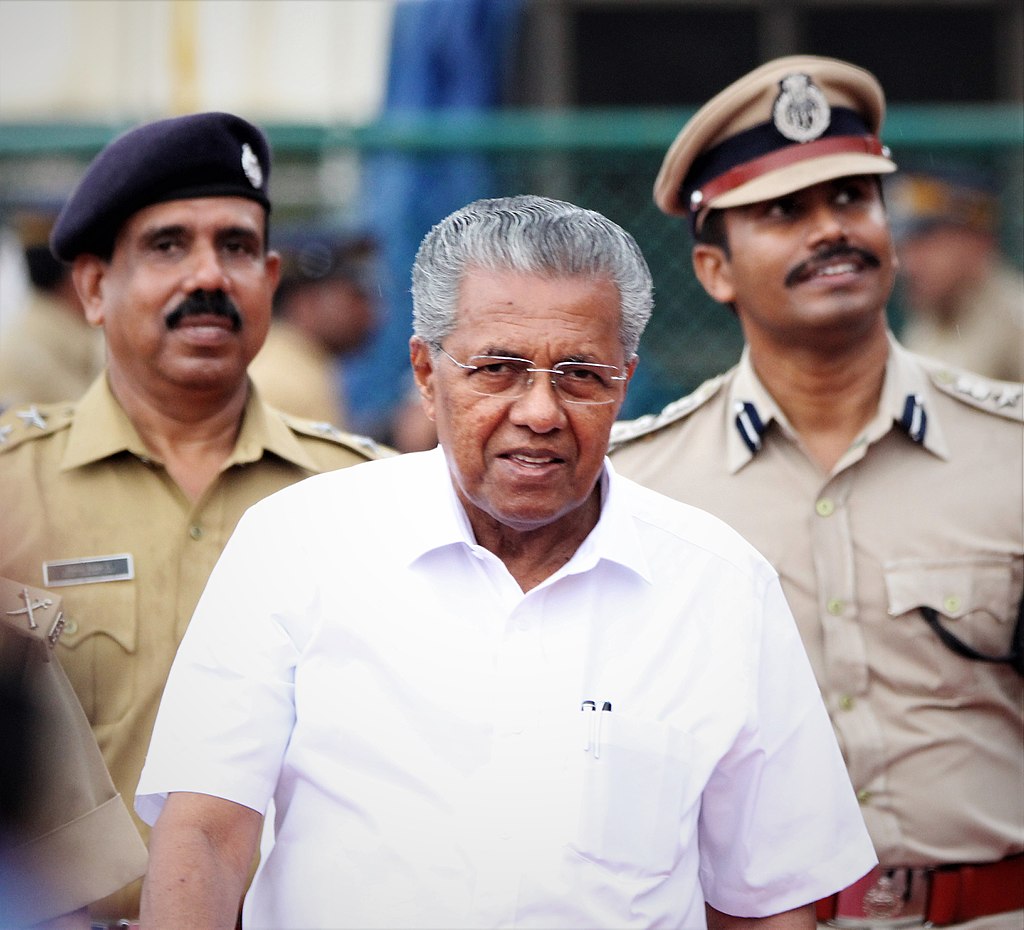The CPI(M), which prides itself on being at the forefront of the movements against muzzling dissent, is using similar laws in Kerala.

Kerala Chief Minister Pinarayi Vijayan. (Credits: Wikimedia Commons)
On 26 July, the Kerala government approached the Supreme Court to challenge a Kerala High Court order and restore charges under the Unlawful Activities (Prevention) Act or UAPA against alleged Maoist leader Roopesh, who was charged under the act as well as Section 124 (a) of the IPC, which deals with sedition.
A division bench of Justices K Vinod Chandran and C Jayachandran of the Kerala High Court on 17 March made it clear in their judgement that the stipulation of time to grant sanction for prosecution under the UAPA was a mandatory and sacrosanct requirement, and any failure to adhere to it would vitiate the sanction order.
The UAPA is criticized by human rights activists all over the country as it is used as a tool to silence those who criticize authority — specifically governments.
There are numerous instances in Kerala where the police are said to have played fast and loos with sections of the UAPA.
The Kerala Police registered as many as 145 UAPA cases from 25 May, 2016, to 19 May, 2021.
The state government has also set up an Anti-Terrorism Squad (ATS) that looks into cases of such nature.
The CPI(M) and its central leadership have been vocal against the use of UAPA on individuals, and have on several instances called the law draconian.
However, it seems the party is unwilling to demand that the police — in the very state it rules — not use such laws against political activists.
The Pantheerankavu case is one of the more prominent instances where the use of the UAPA sparked major controversy.
Students Allan Shuhaib and Thaha Fasal were arrested by the Kerala Police on allegations of possessing Maoist literature.
It was alleged that Shuhaib and Fasal — branch members of the CPI(M) — were also involved in activities related to the banned Communist Party of India (Maoist).
The Kerala Police arrested then 20-year-old Shuhaib and 22-year-old Fasal on 1 November, 2019.
Shuhaib, an undergraduate student of law, told South First: “In our case, there was no allegation from the investigating agencies that we had taken part in any militant activity. Section 20 of the UAPA, which deals with becoming a member of a banned organization, was initially used by the Kerala Police, but was later removed from the NIA charge sheet. However, the NIA subsequently added these sections back into the charge sheet.”
As both Shuhaib and Fasal were Muslim, the incident led to allegations of Islamophobia against the CPI(M)-led Kerala government.
However, Shuhaib said although Islamophobia was a reality, in their case the factors that led to their arrest were their political beliefs and alleged affiliations.
Fasal described to South First the pathetic conditions in prison. Although the two students were not beaten up, they found many prisoners being tortured both mentally and physically inside the jails.
“In high-security jails, there were three or four incidents that I know of where people were tortured in secret spaces in the jail. In high-security prisons, most people who are tortured are political prisoners. For over seven days I wasn’t even allowed to use the outside toilet and was told to use the one inside the cell. The political prisoners charged with UAPA are not even allowed books,” he said.
A political resolution was adopted by the CPIM in its 23rd congress held on 6-10 April in Kannur.
In the resolution, under the title “Growing Authoritarianism”, it said: “The UAPA/Sedition/NSA are indiscriminately used to detain hundreds of people without even proper charges being framed.”
The resolution further stated that these draconian provisions were invoked not only against the minorities who are specifically targeted but also against journalists and others who disagree with or express dissent against the government.
NK Ibrahim, a 68-year-old tea labour leader, was charged under the UAPA in 2015 and spent seven years in jail.
Ibrahim survived cardiac arrest twice, and was also a diabetic with other serious health ailments. His situation in jail was similar to that of Jesuit priest Stan Swamy. However, the government and jail authorities turned a blind eye to his issues.
Ironically, after the death of the priest, the Kerala chief minister Pinarayi Vijayan tweeted “Deeply saddened by the passing of Fr. Stan Swamy. Unjustifiable that a man who fought all through his life for our society’s most downtrodden, had to die in custody. Such travesty of justice should have no place in our democracy. Heartfelt condolences! [sic]”
Meanwhile, Shuhaib and Fasal both witnessed the health-related sufferings of Ibrahim in Viyyur central jail.
“When we speak of Ibrahim ikka’s (brother) case, the CPI(M) people say it was handled by the NIA and not by the Kerala Police. But who is in charge of the jails in Kerala? Isn’t it under the state government?” Shuhaib asked.
In most cases registered under the UAPA, the allegations appear to be thin and the conviction rate negligible.
Activists opined that when the charges are filed, there is a delay in taking up the case by the courts.
They also said that in UAPA cases, proof of burden seems to rest on the defendant rather than the prosecutor, even in bail hearings.
Shuhaib said although he doesn’t want to go back to jail, the time he spent in jail was a learning experience that gave him — as a law student — better insights into the system, law, and justice.
Both he and Fasal intend to raise their voices against laws like the UAPA and further study the situation of prisoners in jails, with an emphasis on political prisoners.

Jul 26, 2024

Jul 26, 2024

Jul 26, 2024

Jul 25, 2024

Jul 25, 2024

Jul 25, 2024